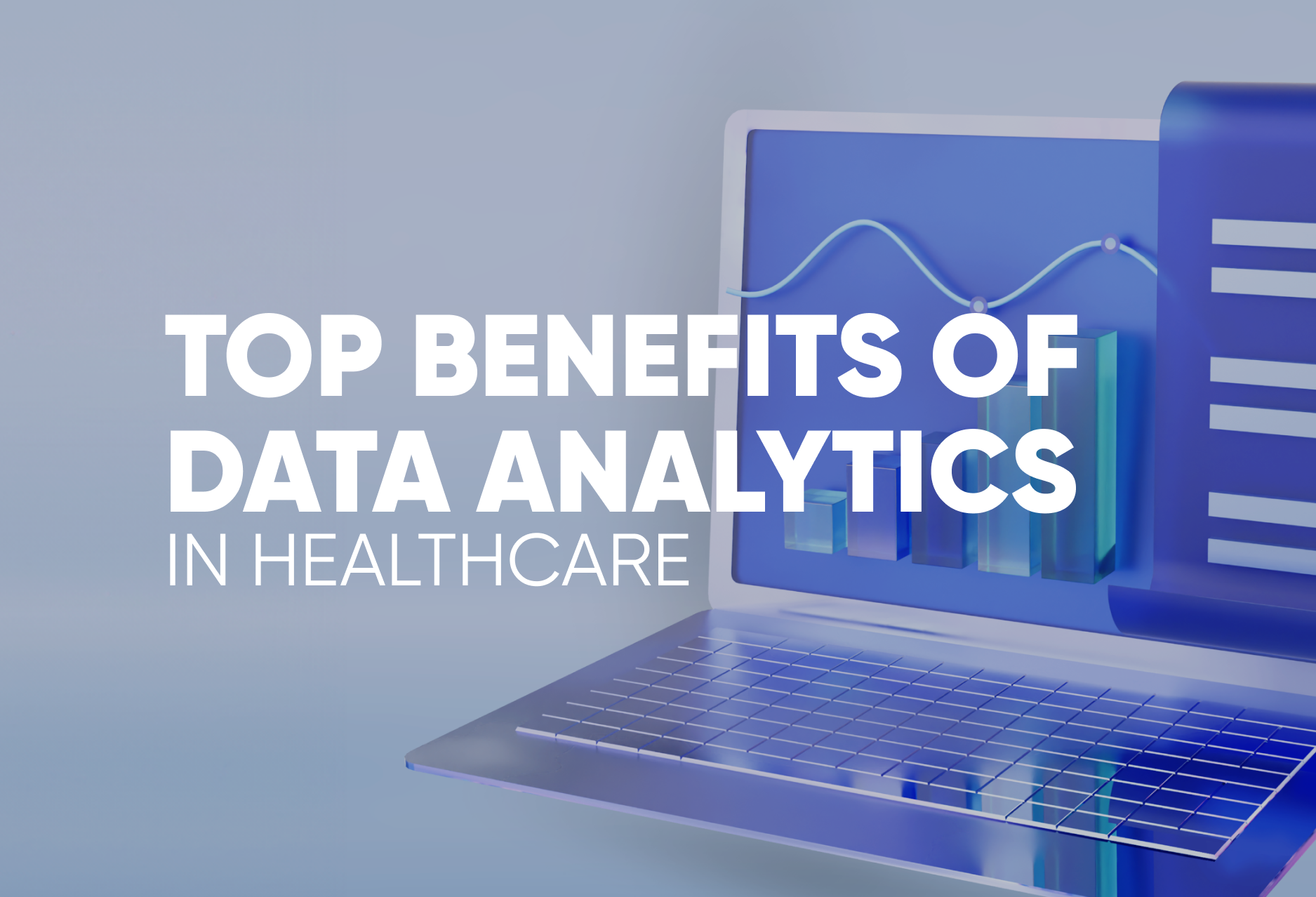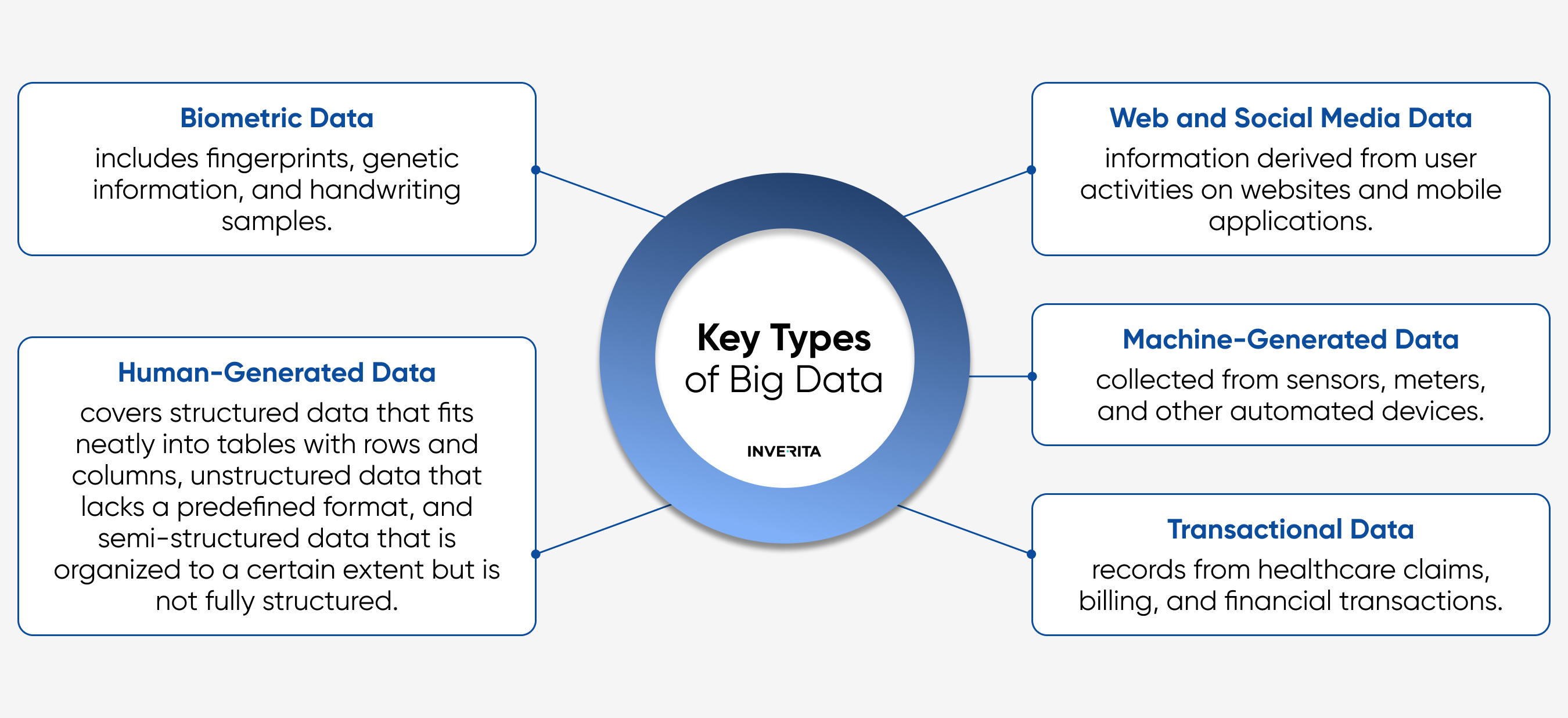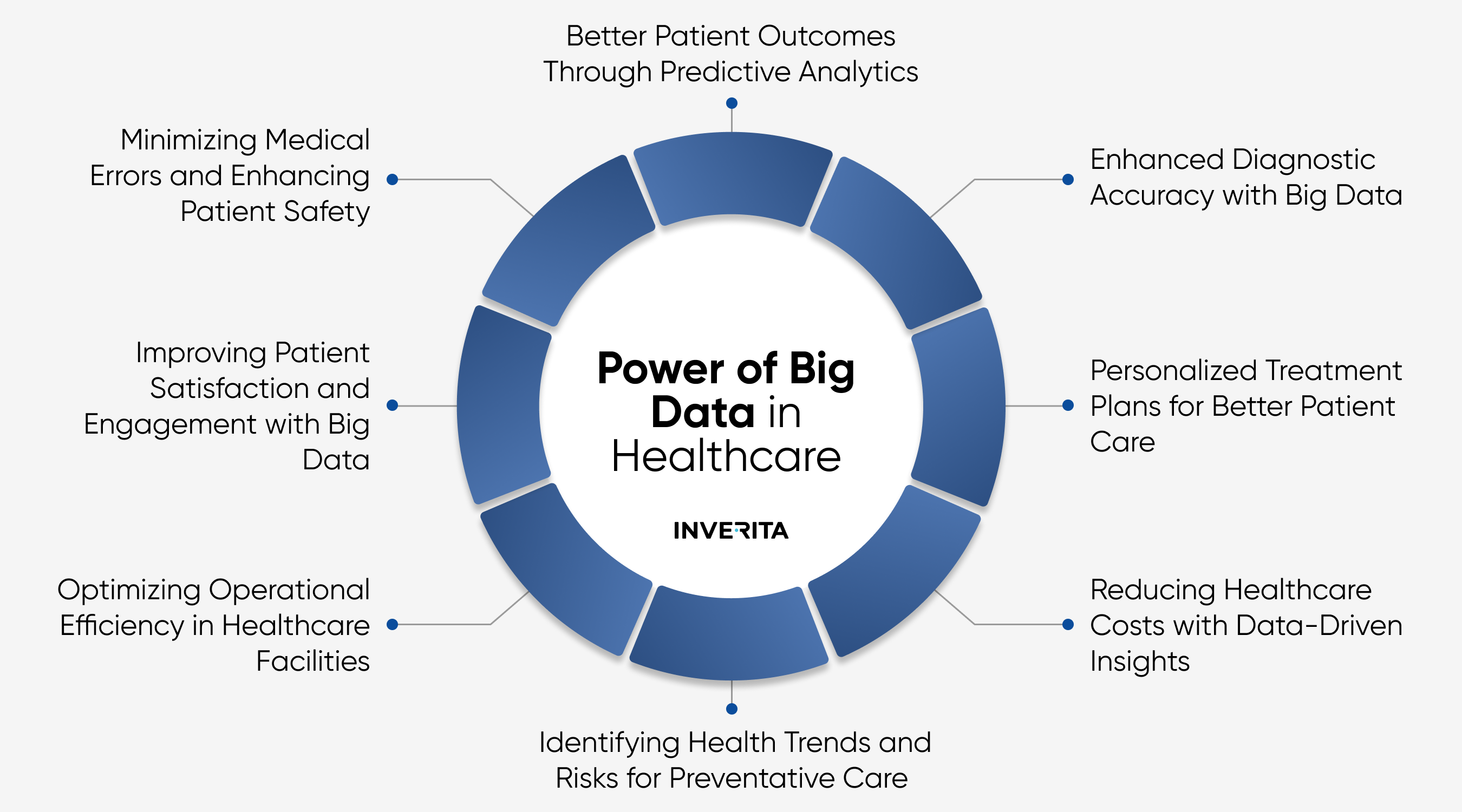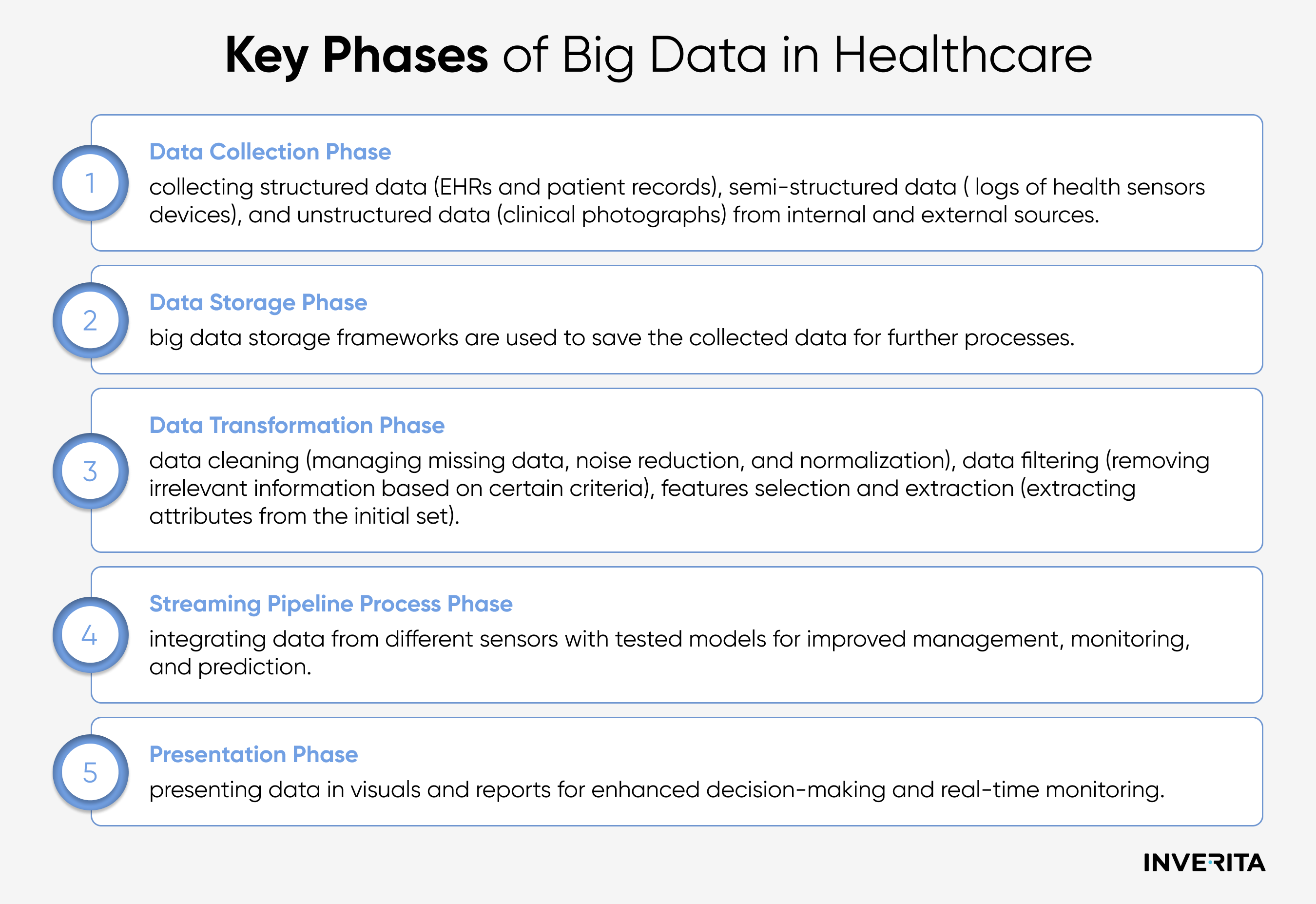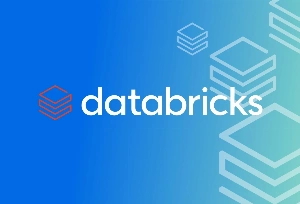1. Improving Patient Outcomes Through Predictive Analytics
Predictive analytics relies on advanced algorithms and machine learning techniques to assess health risks and enable early medical intervention. By integrating electronic health records, real-time wearable data, and clinical trial insights, healthcare providers gain a deeper understanding of human health and give personalized recommendations. Additionally, predictive models can analyze medical histories, helping to optimize treatment plans, improve therapy effectiveness, and reduce hospital admissions.
2. Enhancing Diagnostic Accuracy with Big Data
Big data analytics improves diagnostics by integrating vast and complex datasets – EHRs, genetic profiles, and medical imaging – to identify diseases early. ML-based models analyze historical patient data, environmental factors, and clinical patterns to detect high risk patients and predict disease progression. Additionally, dig data analytics systems compare a patient’s symptoms with extensive medical databases, suggesting potential diagnoses that might be overlooked by humans.
3. Personalizing Treatment Plans for Better Patient Care
Complex data analysis processes a patient’s genetic profile, medical history, and lifestyle factors, enabling personalized treatment tailored to individual biological and environmental characteristics. Predictive modeling also enhances ongoing care by identifying future health risks – these valuable insights allow doctors to create effective preventive plans.
4. Reducing Healthcare Costs with Data-Driven Insights
Another important benefit of big data in healthcare is efficient resource allocation. Healthcare providers can analyze hospital admission patterns, treatment effectiveness, and staffing needs in real time to optimize expenses while maintaining high-quality care.
5. Identifying Health Trends and Risks for Preventative Care
Data helps healthcare organizations predict epidemics outbreaks and pinpoint risk factors for various diseases. Advanced analytics provide crucial insights into outbreak locations, transmission rates, and affected demographics, allowing for proactive and informed responses to public health threats.
6. Optimizing Operational Efficiency in Healthcare Facilities
Through a systematic review of data from patient medical records, prescriptions, medical devices, and more, medical organizations can adjust their workflows for better efficiency. Predictive models help anticipate peak times in various departments, enabling medical staff to allocate resources effectively, minimize wait times, and optimize scheduling.
7. Improving Patient Satisfaction and Engagement with Big Data
Big data elevates patient interactions with medical specialists and improves satisfaction rates – healthcare providers use data analytics to assess patient feedback and make informed decisions to improve the quality of care as well as overall patient experience.
Additionally, big data boosts patient engagement in their healthcare through personalized recommendations and remote monitoring.
8. Minimizing Medical Errors and Enhancing Patient Safety
Big data analytics reduces medical errors by identifying inconsistencies in patient records, drug prescriptions, and test results. Analytics solutions process data from EHRs to detect anomalies, pinpointing potential health issues for manual inspection. Data analytics systems can also correct diagnostic errors by comparing patient symptoms with common diseases.
Big Data Analytics in Healthcare: Real-World Use Cases
- University of Florida used Google Maps and public health data to create heat maps for population growth and chronic diseases to better allocate healthcare resources to underserved areas.
- Cancer Moonshot Program leverages big data analytics to track cancer treatment and recovery rates and determine the most effective treatment strategies.
- Mount Sinai Health System used ML to analyze EHRs and identify high-risk heart failure patients, reducing hospital readmissions by 20% with early medical intervention.
- Texas Children's Hospital implemented a data-driven solution to optimize space utilization. They analyzed EHR data and developed a visual interface that calculates occupancy based on appointment times, required space, and support staff availability.
- Johnson & Johnson partnered with Databricks to unify over 35 global data sources into a single analytics platform, improving supply chain visibility. The solutions allow them to predict demand, ensure timely vaccine delivery, and track patient therapy products, reducing data engineering costs and cutting data processing time.
- SOPHiA GENETICS created a ML-enabled platform to analyze over 1.3 million genomic profiles, helping researchers develop precision medicine and enabling clinicians to choose the most effective treatments based on genomic and radiomic data.
Challenges and Considerations in Implementing Big Data Analytics
Despite the long list of benefits of big data in healthcare, its implementation also poses certain challenges that must be acknowledged before adoption and addressed properly.
Data Privacy and Security Issues in Healthcare
The healthcare industry deals with sensitive patient data that requires strong protection. Ensuring privacy and safety goes far beyond compliance with industry-specific regulations. Medical organizations need a comprehensive protection strategy, including cybersecurity measures to prevent breaches, data leaks, or unauthorized access.
Data Quality
High data quality is essential for accurate and effective analysis. Through standardized data entry and validation processes, organizations can remove duplications and irrelevant information and correct structuring. Otherwise, poor data quality can lead to false conclusions and affect patient outcomes.
Data Integration and Interoperability Challenges
Healthcare systems operate with data from diverse sources across multiple departments. The lack of consistent formats, structures, and technologies presents integration and interoperability hurdles, thus complicating further data sharing and leading to inconsistencies and inaccuracies in analysis.
Overcoming Resistance to Big Data Adoption in Healthcare
Adopting data-driven processes and integrating healthcare analytics often involves overcoming resistance to change through educating employees on the importance of digital initiatives, proper training, support, fostering the culture of innovation, feedback collection, and continuous improvement.
Big Data Analytics Process in Healthcare:

